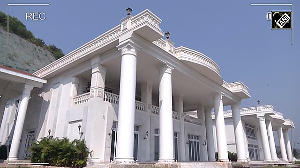Much indignation is being expressed at disgraced Satyam founder Ramalinga Raju's alleged political links that facilitated the rise and rise of his group and family up the wealth stakes. The surprise is that everyone is expressing such righteous anger.
As any businessman in India will tell you (off the record, of course), nurturing political connections is a reality attached to doing business in India. Indeed, the flame-out of Raju, hitherto the exemplar of the new-age businessman, actually shows how little has changed after almost 18 years of economic liberalisation. As before, politics continues to be an integral part of the Indian business milieu.
Should this matter? Doesn't this happen elsewhere? We know, for example, that even the Clinton years saw the White House transformed into a sleepover for American businessmen donating money in return for policy favours (apparently there's some social cache attached to businessmen who get to spend a night at the president's residence).
The answer to the first question, however, is, yes it should matter if India is to really make it to the big stage of global business. Businesses through the ages basically work on trust and the security of property rights. One of the things that distinguish developing countries from developed ones is the degree of security of property rights.
In his 2000 book, Mystery of Capital, Peruvian economist Hernando De Soto suggested that state protection of property rights in a formal system is a key reason capitalism has succeeded in the West and fails elsewhere.
Some suggest that De Soto may be overstating the point since it cannot be said that capitalism has failed in, say, south-east Asia, Korea or China where the nexus between politics and business remains robust.
Still, his point is well-illustrated in India where judicial systems are slow and political influence and connections remain critical for such basics as land acquisition, water connections, licences and permits. When a politician becomes the alibi for a formal property rights system, the line between amorality and corruption is often blurred.
Nevertheless, this is a connection that politicians today exploit fully to give crony capitalism a peculiarly reformist connotation. From Chandrababu Naidu and Digvijay Singh in the late nineties to Buddhadeb Bhattacharjee, Nitish Kumar and Narendra Modi now, many have acquired a vague understanding of the benefits of being pro-industry.
The problem is that all of them, without exception, have centred their transformational efforts on themselves rather than on the institutions that can make industrialisation truly sustainable. As a result, the sanctity of many businessmen's contracts stretches only as far as the politicians' patronage. A monument to this stands in Maharashtra where the Dabhol Power Company found its sole buyer reneging on a patently uneconomic power tariff imposed on it by a political regime.
In Andhra Pradesh, Chandrababu Naidu was always proud to tell prospective investors that power and water connections would never be an issue as long as he was in power, and industrialists in his state were truly appreciative of his ability to help. The point, however, is that little within the Andhra bureaucracy really changed to keep the momentum going after he lost power.
In West Bengal it became clear that the success of Tata Motors' Nano project hinged heavily on huge discounts on power tariffs and local imposts and on low-priced loans from the state government. It is worth noting that Modi replicated many of West Bengal's concessions to attract the Nano project to Gujarat.
Given these generous hand-outs, it would have been difficult for Ratan Tata to have declined the invitation. Tata has been widely criticised for overlooking Modi's poor communal record in the interests of his pet project. Actually, Tata needs to be worried about much more than that. Many businessmen have extracted generous concessions from one government, only to see their businesses at risk when it is replaced by another, less friendly regime.
In that respect, Raju tried to de-risk his business by being secular in his political affiliations. The truth is that his political connections would have attracted little attention had he not confessed to this massive accounting fraud. It's the fact that businessmen in India still need politicians to facilitate their growth plans that should have people worried.







 © 2025
© 2025